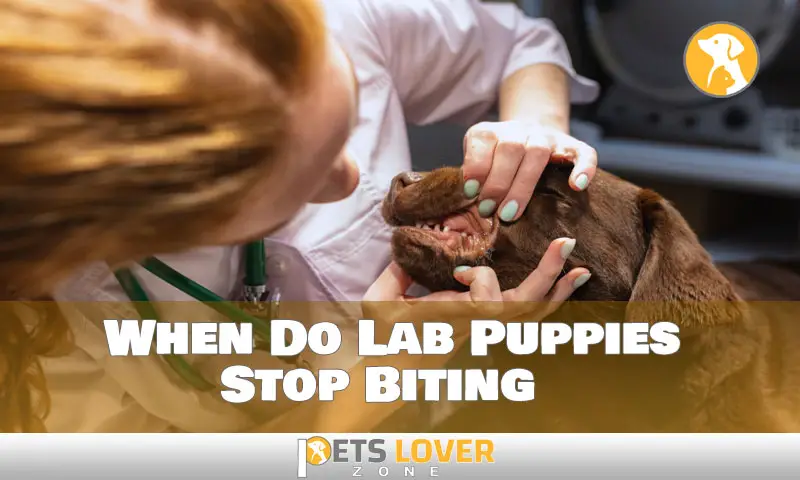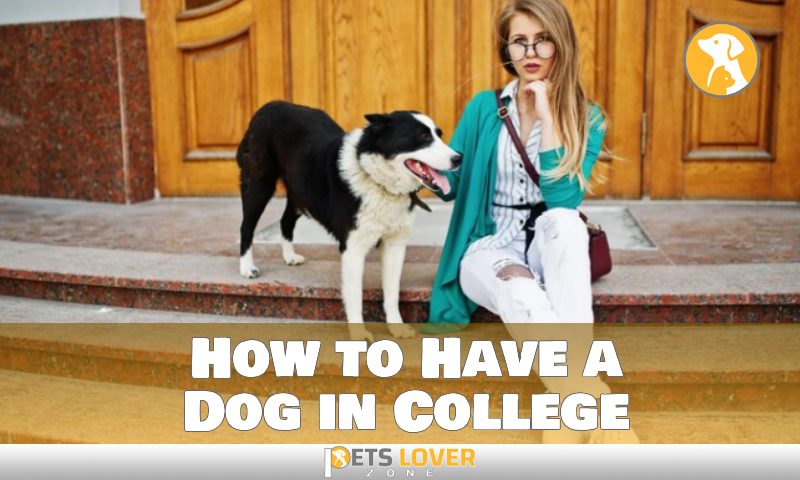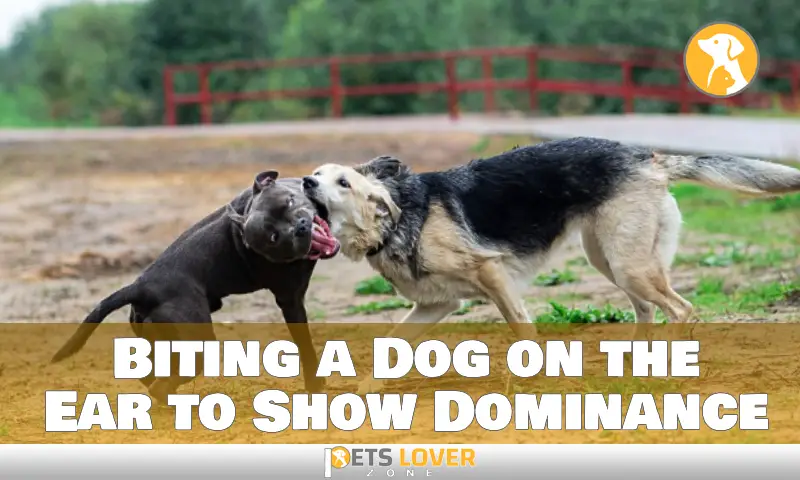If you just brought a Lab puppy home, you might be wondering when they’ll ultimately stop biting.
Lab puppies can be quite playful and sometimes excitedly bite with their little razor-sharp teeth. Although it is natural for puppies to explore and bite, it can quickly become a problem if it isn’t managed properly. The good news is that there are steps you can take to teach your puppy appropriate behavior and help them stop biting sooner rather than later.
In this article, we’ll discuss when Lab puppies usually stop biting, how to manage it in the meantime, and what techniques work best for training them not to bite. We will also share some tips on how to keep yourself safe from your pup’s sharp little teeth.
Why Do Puppies Bite?
Puppy biting is a form of social play and communication, and it’s natural for puppies to use their mouths to explore and learn what is acceptable. When puppies are playing with each other, they usually nip or bite during the playtime. Although it may appear aggressive, it’s their way of expressing their playful side.
If they feel threatened or uneasy in a particular circumstance, puppies may also bite out of fear or displeasure. A puppy may bite as a protective mechanism if it feels threatened or overwhelmed. When puppies haven’t yet been exposed to a variety of environments and circumstances, this form of biting frequently happens.
Finally, puppy biting can also be caused by overexcitement or teething discomfort. Puppies often get overly excited during playtime because they don’t yet understand the boundaries of how to behave around humans and other animals. Teething discomfort is another common cause of puppy biting — as your pup’s new teeth develop, they can become sensitive, leading to lots of chewing and biting on objects as a result.
The Power of Re-Directing Chewing
Re-directing your lab puppy’s biting behavior is a great way to help him understand that it’s not okay to chew on anything and everything. When he bites, or nips at you, yelp loudly and pull away. This lets him know that it’s not okay and that it hurts. Then, offer an appropriate toy for him to chew on instead. This will show him that you don’t mind if he chews—as long as it’s on the toy and not your skin.
Finally, when he continues to bite despite the re-direction, use timeout—also known as “time outs” or “positive time outs”—to gently stop the biting behavior. Place your dog behind a baby gate or in a secure space (like his kennel) and don’t let him out until he has calmed down. He will learn to control his mouth and engage with you more correctly if you do this repeatedly.
Establish Bite Inhibition Rules
If you’re bringing home a new Labrador puppy, understanding the basics of bite inhibition is essential for helping your puppy grow into a well-behaved, loving pet.
Until they are at least 8 weeks old, puppies should be permitted to remain with their litter. By seeing their mother and other members of the litter, they can acquire adequate biting inhibition. By educating your puppy to use their mouth softly even when they’re agitated or startled, you can teach them bite inhibition.
It’s important to establish rules early on with your puppy to help them understand proper behavior. For example, if they nip at your hand while playing, let out a high-pitched yelp and stop interacting with them for a few seconds. This will help reinforce the idea that biting is unacceptable behavior and is not tolerated in your home.
Positively Reinforce Good Behavior
Positive reinforcement is one of the most effective ways to stop Lab puppies from biting. By introducing a favorable stimulus after the desired behavior appears, a puppy will learn to do the desired behavior in order to receive rewards. Instead of using threats or punishment, positive reinforcement focuses on rewarding the beneficial behaviors you want your dog to exhibit.
Rewards could be anything from treats, praise and playtime, and it’s important to choose ones that work best for your dog so they can understand and internalize which behaviors will result in getting them. Additionally, verbal praise should always be used as this builds confidence in your puppy and helps keep positive reinforcement up.
The repetition of reward-based activities helps create patterns of behavior that really influence your pet’s future decisions. Despite the fact that individual Lab puppies stop biting at different ages, you can foster an environment where good habits are quickly replaced with bad ones by using positive reinforcement.
Alternative Ways to Release Playful Energy
From puppies to adults, a Labrador’s natural behavior is one that can be quite mischievous. While it’s normal for Lab puppies to explore their surroundings through their mouths, it’s important to establish your role as the leader of the pack in order to discourage excessive biting. Luckily, there are alternative ways to release this energy and cultivate a more playful energy in Labs of all ages.
Smiling and Laughing
When it comes to releasing playful energy, nothing beats a good ole’ fashioned smile or laugh. Smiling can help create a positive atmosphere where you can engage in more productive activities with your furry family member. The contagiousness of laughter has even been studied—it’s no wonder why our four-legged friends always seem so eager to join us at playtime!
Creative Activities
Creative activities can help encourage alternative outlets for releasing playful energy. Instead of running around the house or chewing on furniture, try engaging in different activities such as puzzles and games or interactive toys that require mental stimulation. This will help keep both you and your pup busy while also providing bonding opportunities.
New Thoughts and Actions
Last but not least, reprogramming your thinking by taking creative action is a fantastic method to build positive energy with your Labrador puppy. If you want to keep both of you engaged in the same activity, start by going outside and exploring new locations or taking on new tasks as a team. Anything that fosters change, progress, and enthusiasm is guaranteed to give you both an emotional lift.
Monitor Your Puppy’s Development
Puppy development is a critical stage for any family. It is important to stay on top of your puppy’s progress to ensure his safety and well-being as he grows.
By monitoring your puppy’s development, you can better understand when lab puppies will stop biting. Puppy development stages range from Neonatal (0-2 weeks) to Adolescence (6-18 months). Some key milestones that may be helpful in understanding when your lab puppy stops biting include:
- Puppies learn to bark, walk, play, and go potty between 2-4 weeks and 8-16 weeks
- Puppy crawling more easily and cuddled only a few minutes a day are milestones in puppy development
The exercises and commands your puppy should be learning as he gets older can also be better understood by keeping track of his developmental phases. This will enable you to establish a favorable atmosphere that best meets the demands of your dog.
People Also Like: When Does Puppy Breath Go Away?
Conclusion
The process of teaching your cherished Labrador puppy to stop biting calls for persistence, commitment, and consistency. The best time to begin training them is when they are very young. Keep in mind that while they might never completely quit biting, it can be greatly minimized and handled with the appropriate technique.
Constant positive reinforcement, communication, and monitoring provide the tools necessary to help your puppy learn healthy behavior and boundaries. Keep in mind that it is normal for Lab puppies to bite after they reach 3 or 4 months of age, and they should be well trained by the time they reach 12 months old. With the right approach and a loving environment, you and your pup can look forward to many happy, bite-free years together.





